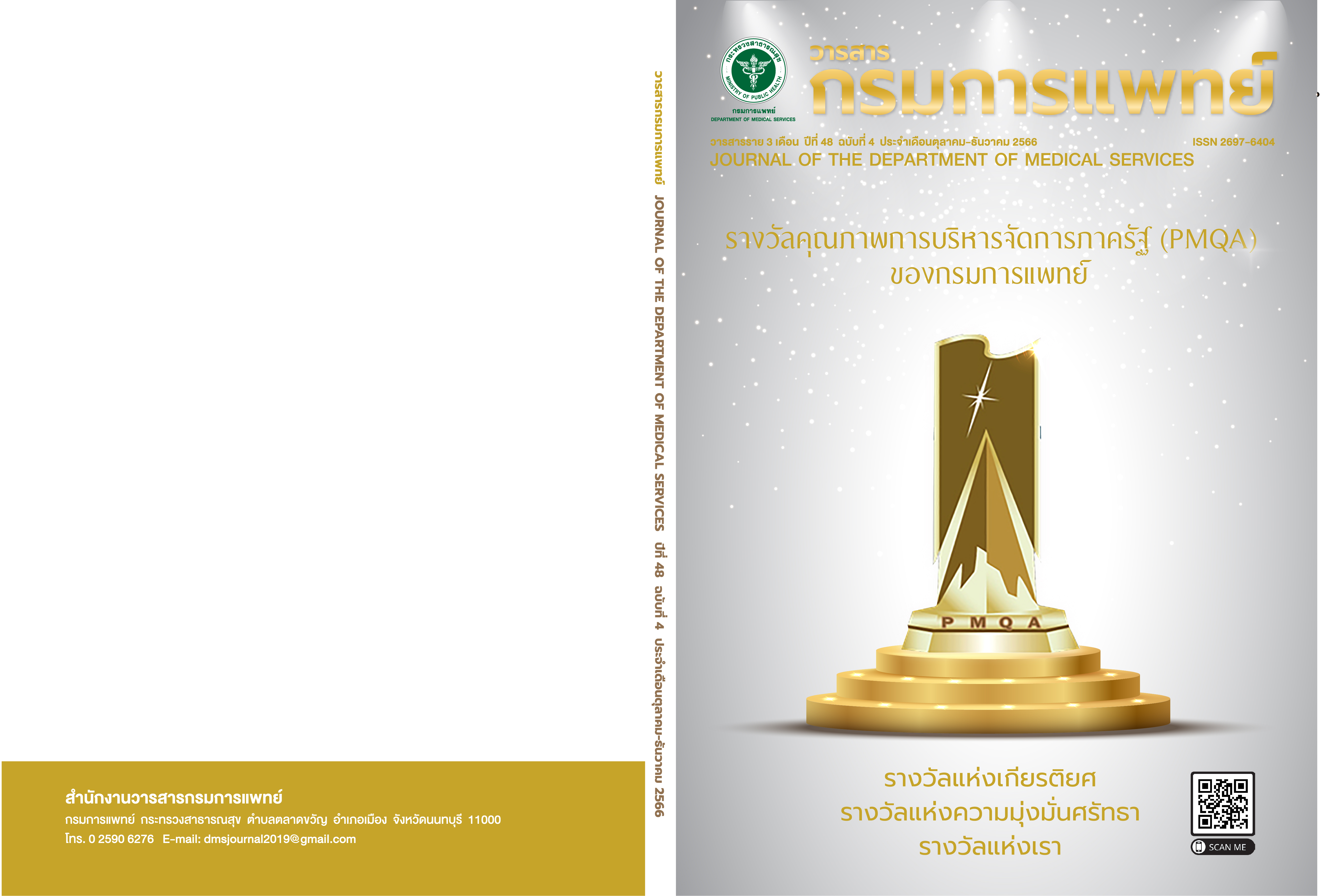The Effectiveness of Multidisciplinary Team Approach in Post-stroke Dysphagia Rehabilitation: A Retrospective study
Keywords:
Dysphagia, Stroke, Multidisciplinary team rehabilitationAbstract
Background: Dysphagia is one of the most important and common conditions in stroke patients. Previous studies have found that guidelines for dysphagia rehabilitation by a multidisciplinary team improve the efficiency in the rehabilitation of patients with dysphagia. However, there are still some differences regarding clinical approach, as well as medical professionals who take part in the multidisciplinary team. Objective: To study the result of how the dysphagia rehabilitation by the multidisciplinary team of Sakon Nakhon Hospital affected the swallowing function, as well as the incidence of pneumonia in stroke patients. Method: We performed a retrospective descriptive study. Data were collected from medical records of stroke patients who had dysphagia and were admitted to the inpatient unit at Sakon Nakhon Hospital from January 1, 2020, to December 31, 2022. Results: There were 70 cases in total. 52.9% had an intracerebral hemorrhage diagnosis. The average age was 58.8 years old. The FOIS scores at the initial assessment, 1st, 3rd, and 6thmonths were 1.6, 4.9, 5.4, and 5.5, respectively, and statistical analysis revealed a statistically significant difference (p < .05). Additionally, this study revealed that 20% of post-stroke dysphagia patients developed pneumonia in the 1st, 3rd and 6th months were 0, 1.4 and 2.9% respectively. Conclusion: This study demonstrated that the multidisciplinary team approach in post-stroke dysphagia rehabilitation has significantly increased FOIS scores at the 1st, 3rdand 6th months after swallowing rehabilitation.
References
Tiamkao S, Ienghong K, Cheung LW, Celebi I, Suzuki T, Apiratwarakul K. Stroke incidence, rate of Thrombolytic therapy, mortality in Thailand from 2009 to 2021. Open Access Maced J Med Sci 2022;10(E):110-5.
Banda KJ, Chu H, Kang XL, Liu D, Pien LC, Jen HJ, et al. Prevalence of dysphagia and risk of pneumonia and mortality in acute stroke patients: a meta-analysis BMC Geriatr 2022;22(1):420.
Terré R, Mearin F. Oropharyngeal dysphagia after the acute phase of stroke: predictors of aspiration. Neurogastroenterol Motil 2006;18(3):200-5.
Heart and Stroke Foundation of Ontario. Management of Dysphagia in Acute Stroke; An Educational Manual for the Dysphagia Screening Professional. Canada: Heart and Stroke Foundation of Canada; 2006.
Cohen DL, Roffe C, Beavan J, Blackett B, Fairfield CA, Hamdy S, et al. Post-stroke dysphagia: A review and design considerations for future trials. Int J Stroke 2016;11(4):399-411.
Singh S, Hamdy S. Dysphagia in stroke patients. Postgrad Med J 2006;82(968):383-91.
Reber E, Gomes F, Dahn IA, Vasiloglou MF, Stanga Z. Management of dehydration in patients suffering swallowing difficulties. J Clin Med 2019;8(11):1923.
Kim DY, Park HS, Park SW, Kim JH. The impact of dysphagia on quality of life in stroke patients. Medicine (Baltimore) 2020;99(34):e21795.
Aoki S, Hosomi N, Hirayama J, Nakamori M, Yoshikawa M, Nezu T, et al. The multidisciplinary swallowing team approach decreases pneumonia onset in acute stroke patients. PLoS ONE 2016;11(5):e0154608
Benjapornlert P, Arayavichanont P, Manimmanakorn N, Wattanapan P. The prevalence of oropharyngeal dysphagia in acute stroke patients at Srinagarind Hospital. J Thai Rehabil Med 2018;28(2):49-53.
Crary MA, Mann GD, Groher ME. Initial psychometric assessment of a functional oral intake scale for dysphagia in stroke patients. Arch Phys Med Rehabil 2005;86(8):1516-20.
Sirindhorn National Medical Rehabilitation Institute. Clinical practice guidelines: Dysphagia. Nonthaburi: Sahamitr printing & publishing company limited; 2019.
Gandolfi M, Smania N, Bisoffi G, Squaquara T, Zuccher P, Mazzucco S. Improving post-stroke dysphagia outcomes through a standardized and multidisciplinary protocol: an exploratory cohort study. Dysphagia 2014;29(6):704-12.
Chiu CC, Lin HF, Lin CH, Chang HT, Hsien HH, Hung KW, et al. Multidisciplinary care after acute care for stroke: a prospective comparison between a multidisciplinary post-acute care group and a standard group matched by propensity score. Int J Environ Res Public Health 2021;18(14):7696.
Starmer HM, Dewan K, Kamal A, Khan A, Maclean J, Randall DR. Building an integrated multidisciplinary swallowing disorder clinic: considerations, challenges, and opportunities. Ann NY Acad Sci 2020;1481(1):11-9.
D’Netto P, Rumbach A, Dunn K, Finch E. Clinical predictors of dysphagia recovery after stroke: a systematic review. Dysphagia 2023;38(1):1-22.
Grossmann I, Rodriguez K, Soni M, Joshi PK, Patel SC, Shreya D, et al. Stroke and pneumonia: mechanisms, risk factors, management, and prevention. Cureus 2021;13(11):e19912.
Galovic M, Leisi N, Muller M, Weber J, Abela E, Kagi G, et al. Lesion location predicts transient and extended risk of aspiration after supratentorial ischemic stroke. Stroke 2013;44(10):2760-7.
Wilmskoetter J, Daniels SK, Miller AJ. Cortical and subcortical control of swallowing - can we use information from lesion locations to improve diagnosis and treatment for patients with stroke?. Am J Speech Lang Pathol 2020;10(29):1030-43.
Downloads
Published
How to Cite
Issue
Section
License
Copyright (c) 2023 Department of Medical Services, Ministry of Public Health

This work is licensed under a Creative Commons Attribution-NonCommercial-NoDerivatives 4.0 International License.
บทความที่ได้รับการตีพิมพ์เป็นลิขสิทธิ์ของกรมการแพทย์ กระทรวงสาธารณสุข
ข้อความและข้อคิดเห็นต่างๆ เป็นของผู้เขียนบทความ ไม่ใช่ความเห็นของกองบรรณาธิการหรือของวารสารกรมการแพทย์



